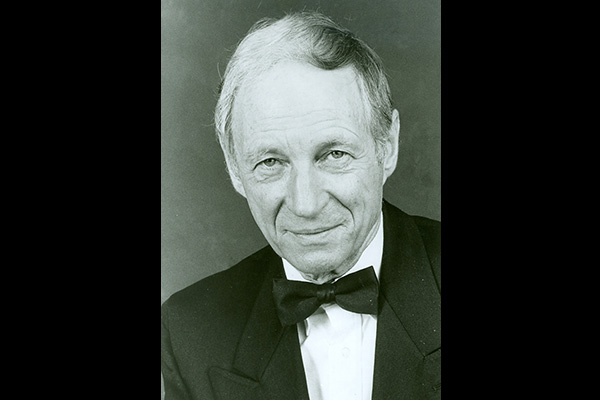Remembering Harold Blumenfeld
The Department of Music in Arts & Sciences will honor professor emeritus Harold Blumenfeld, who died last fall at he age of 91, with a Memorial Concert in Graham Chapel April 19. The performance will feature Blumenfeld’s settings of poems by Rainer Maria Rilke and Arthur Rimbaud as well as works by Johann Sebastian Bach, Paul Hindemith and Franz Schubert.
Study finds 1.2 percent of preschoolers on Medicaid use psychotropic drugs
A new study finds that that 1.2 percent of American preschool children on Medicaid are using psychotropic drugs, including antidepressants, mood stabilizers and medications for attention-deficit disorder. Using 2000-2003 Medicaid Analytic Extract data from 36 states, a group of researchers at the Brown School at Washington University in St. Louis and at Washington University School of Medicine in St. Louis found preschoolers are receiving psychotropic medications despite limited evidence supporting safety or efficacy.
McCaskill holds roundtable discussion on aging at Washington University
As part of her series of Senior Listening Sessions across Missouri, Sen. Claire McCaskill held a roundtable discussion with experts on retirement security, elder justice and healthy aging March 31 at the Brown School’s Goldfarb Hall. Among the roundtable participants were seven from Washington University in St. Louis.
CSD report offers insights into how young people save in developing countries
A new project from the Center for Social Development at Washington University in St. Louis shows, among other findings, that girls in developing countries, given equal opportunities, will save as much or more in formal financial institutions than boys. The project was aimed at examining the attitudes and practices of young people in developing economies toward saving money. It has led to new findings that confirm and challenge assumptions about youth saving at formal financial institutions.
CSD’s Grinstein-Weiss alerts U.S. senators to ‘golden moments’ for savings
Appearing March 12 before the U.S. Senate Special Committe on Aging, Michal Grinstein-Weiss, PhD, associate director of the Center for Social Development (CSD) at Washington University in St. Louis, urged U.S. senators to create long-term asset-building policies and to use such “golden moments” as tax time to urge Americans to save.
Legal scholar: Unions must adapt to survive
With the “Right to Work” movement growing in Wisconsin and other states, a majority of states may soon bar employees and unions from negotiating agreements that require non-members to contribute to the costs of representing them. For unions to survive and thrive, at least two significant changes are necessary, argues Marion Crain, JD, vice provost and the Wiley B. Rutledge Professor of Law at Washington University in St. Louis.
Global conference to address social, psychological harm of colorism
Colorism, the practice of discrimination based on skin tone, even among people of color, is rarely addressed publicly and is uniquely different from racism. The Whitney R. Harris World Law Institute at Washington University in St. Louis School of Law will address this growing international issue in what organizers believe is the first international colorism conference on U.S. soil. The conference, “Global Perspectives on Colorism,” will be held Thursday and Friday, April 2 and 3, in Anheuser-Busch Hall.
Homeowners fared better in Great Recession than renters, new study finds
While many Americans took a big financial hit during the Great Recession, homeowners were less likely than renters to lose very large proportions of their wealth, finds a new study from Michal Grinstein-Weiss, PhD, associate director of the Center for Social Development in the Brown School at Washington University in St. Louis.
Stigma of mental illness in India linked to poverty
The stigma surrounding people with severe mental illness in India leads to increased poverty among them, especially women, according to new research led by Jean-Francois Trani, PhD, assistant professor at the Brown School at Washington University in St. Louis.
Segregation, social justice and the American Bottom
The Center for the Humanities and the Sam Fox School of Design & Visual Arts have announced the first recipients of Faculty Collaborative Grants. Presented under the auspices of The Divided City, a new urban humanities initiative, the awards are funded in part by a four-year grant from the Andrew W. Mellon Foundation.
Older Stories

